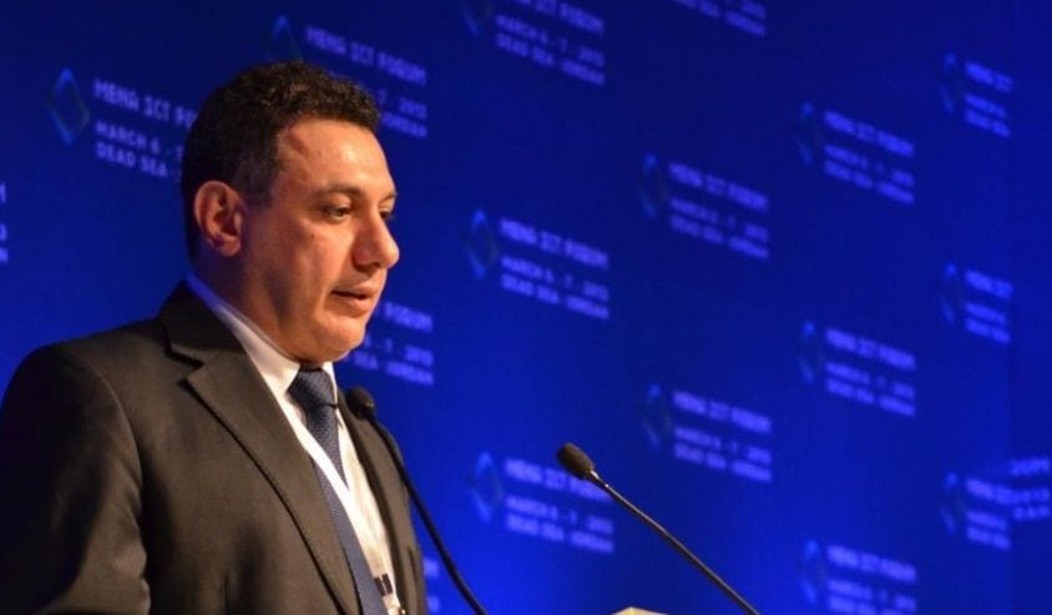A year ago this week, a D.C. information technology and economic development expert was in Tehran at the urging of the Iranian government to speak at a conference on women’s entrepreneurship and employment. The State Department even helped fund his trip, according to his colleagues.
The invitation was extended by no other than Iran’s Vice President of Women and Family Affairs Shahindokht Molaverdi.
It seems to have all been a ruse, as Nizar Zakka was seized by Iran’s Revolutionary Guards as he headed toward the airport after the conference.
Zakka has been held in Iran’s notorious Evin prison, accused of “multiple close ties to the U.S. military and intelligence communities” — espionage.
Zakka, a Lebanese-American, is secretary-general of the Dupont Circle-based IJMA3 group, which lobbies for the information and communications technology industry in the Middle East. He last tweeted on Sept. 9, 2015, about Internet freedom and free expression. It wasn’t his first business trip to Iran.
In their first public acknowledgement that Zakka was being held, the Iranian government’s “evidence” included a picture of the IT expert at a homecoming parade of his high school military academy.
Color Guard, Happy 4th of July pic.twitter.com/Wm5od9o9lw
— Nizar Zakka (@ZakkaNA) July 4, 2015
He also tweeted an American flag photo for the Fourth and a picture of a polo match near D.C.
Happy 4th of July pic.twitter.com/rj2C6yf1jV — Nizar Zakka (@ZakkaNA) July 4, 2015
Not bad playing polo in front 30,000 spectators on the #4thofjuly in washington. pic.twitter.com/ONmSLOhVM2
— Nizar Zakka (@ZakkaNA) July 6, 2015
In July, he tweeted a photo of a Tayyar demonstration — a political movement of Christians and Sunnis staunchly opposed to Hezbollah, Iran’s ally. The Future Movement, as it translates, is led by Saad Hariri, son of the former prime minister, Rafik Hariri. The UN tribunal in the Hariri murder linked the assassination to Hezbollah.
Zakka earned degrees from the University of Texas after graduating from the Riverside Military Academy in Gainesville, Ga., in 1985. He used to work as a software engineer at contractor Kellogg, Brown & Root in the early ’90s.
Zakka’s mother passed away in July, not getting to hold her son one more time. She had pleaded to Ayatollah Ali Khamenei in a letter and video to free Nizar. “My health continues to deteriorate, and every night I can not sleep and I keep awake, pray and pray to God for the release of my son,” she told the Supreme Leader. She stressed that she did not know her “number of remaining days,” and would accept even a temporary visit.
That request was not granted. Just days after her death, Iran announced an indictment against Zakka. The charges and potential punishment are still unclear.
To compound the tragedy, Zakka has been stumbling through the Iranian judicial system with no real consular representation to call his own.
Friends of Zakka — including former Riverside Military Academy president Col. James Benson (USMC ret.), Army Major Gen. John Peabody (ret.), and former Assistant Secretary of the Army Paul Woodley — wrote Secretary of State John Kerry a letter in April, asking the country’s top diplomat to “mount a humanitarian effort” to free the IT expert.
“Nizar is a man without country when it comes to consular assistance. He is a U.S. permanent resident, yet holds a Lebanese passport. The Lebanese government has failed to take up his interest; the Lebanese consul in Tehran has not visited him nor communicated to the Iranian government on his behalf,” they wrote.
“Nizar was traveling in Iran with the knowledge and approval of the U.S. State Department, and his trip was funded with grants from your agency. We believe that the State Department has a moral obligation to help Nizar in his time of need,” they continued. “Time is of the essence… failure to take action promptly on his behalf puts his health and wellbeing at dire risk.”
State Department press secretary John Kirby told reporters that month that “U.S. lawful permanent residents are not U.S. passport holders and must travel on the passport of their nationality.”
“The Immigration and Nationality Act prevents us from providing consular assistance to non-U.S. citizens,” Kirby said. The State Department later amended that to clarify they could offer assistance, but did not elaborate on what that might be.
The Associated Press reported in May that Zakka’s industry consortium had received $730,000 in grants from the U.S. government for Middle East projects such as small-business development and social media training.
Asked in July if the U.S. was working for the release of Zakka, Kirby said he couldn’t comment for privacy reasons. “What I can tell you is that we continue to use all the means at our disposal to advocate for U.S. citizens who need our assistance,” he said. “That’s really as far as I can go on that.”
In addition to the hashtag #FreeNizarZakka, supporters are tweeting with the hashtag #Invited_and_Kidnapped.
“Now more than ever, Nizar needs our help and support; help and support which may ultimately save his life,” his friends and colleagues said in a statement last month. “Nizar’s kidnapping is unfair and unjust, and the process towards his release has proven highly difficult at best, but there is more that we can do in order to help rectify this unfortunate situation and bring about Nizar’s freedom.”
IJMA3 is soldiering forward with its daily business, “not only to continue the good work we do throughout the Middle East/North Africa region, but as a way to honor Nizar and to bring continued attention and advocacy to his unjust detention.”
The Friends of Nizar Zakka, led in part by former Virginia GOP state Rep. David Ramadan, say the captive D.C. resident “strongly believes in the power of technology to provide educational and economic opportunities for all people across the Middle East and North Africa, and has dedicated his life’s work towards furthering that goal.”









Join the conversation as a VIP Member